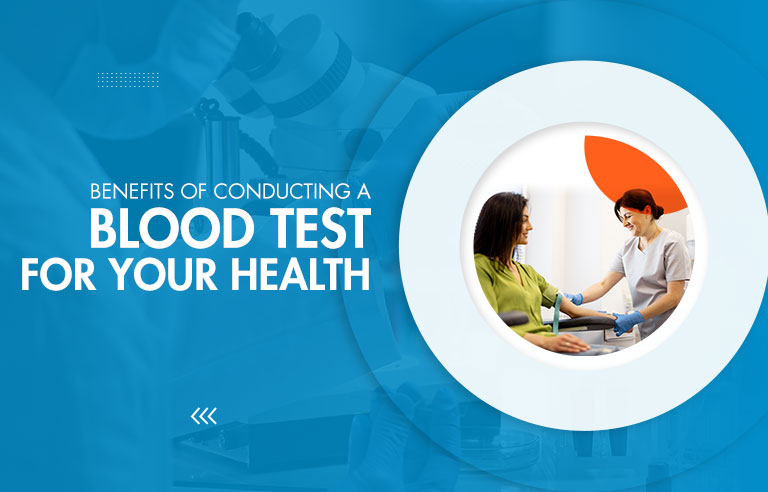
Conducting an annual blood screening is a vital component for the prevention of different kinds of degenerative diseases. By providing a snapshot of your present health condition, blood screening will help to detect probable health concerns before they rise to the surface so they can be managed effectively. Blood tests are very straightforward to carry out quickly and provide lots of information that can be beneficial for you. Regular blood testing is among the most effective ways to maintain a track of your overall well-being. Getting necessary tests at regular intervals will help you to know how your body will change in due course and enable you to make informed decisions based on your health. Here are some ways how a private blood test seems to be beneficial for your health condition. Continue to know more about it.

Common blood tests to perform
Here are some blood tests which can help you to detect diseases at an early stage:
- Metabolic panel: This helps to check the levels of several compounds in your blood and determine the chances of diabetes, hormone imbalances and kidney disease.
- Lipid panel: It is used to check the levels of cholesterol and determine risk of related conditions such as hypertension, cardiovascular disease and stroke
- Complete blood count: The CBC checks for different components of red blood cells, white blood cells, and platelets to detect infection, deficiencies, clotting problems, anemia, or cancer
- Thyroid panel: It checks for proper functioning of thyroid, production of hormone and screening for problems such as thyroid disorders, low protein levels and unusual hormone levels
- Sexually transmitted infection (STI) tests: Different STIs might be detected in the blood tests which include – syphilis, chlamydia, gonorrhea, HIV and herpes
- Coil fitting – This intra uterine device is small T-shaped copper and plastic device put inside your uterus. It releases copper for preventing women from conceiving and protects pregnancy for 5 to 10 years.
What is your blood tested for?
There are several uses of blood tests which are the common types of medical tests. A blood test can help to:
- Know your health condition
- Assess whether you have an infection
- Screen for some genetic conditions
- See how properly your organs like kidneys and liver are working
- Find out whether you have any risk of heart disease
- Evaluate how well your blood clots
- Diagnose diseases such as – anemia, diabetes, HIV/AIDS, cancer and coronary heart disease
Most blood tests will require a few minutes only to get them done and are performed at the GP surgery by a doctor or a phlebotomist.
How blood tests generally work
You need to book an appointment with your GP for drawing your blood with a syringe in your arm or hand going into a vial. After the vial is filled, it goes to the laboratory where it will be examined under a microscope or tested by using other chemicals for different issues.
Various things are measured in the blood tests as they relate to their function, but calcium, haemoglobin, blood glucose and cholesterol levels need to be checked along with red and white blood cells. When you get the results a few days after the blood is drawn, these are common things to check as your private GP determines what the levels mean to your health.
Before conducting a blood test
Most blood tests do not require specific preparation and take a couple of minutes only. Other kinds of blood testing require fasting which means you should not eat anything for 8 to 12 hours before the test. The doctor will inform how you can prepare for your blood test.
What happens when conducting a blood test?
A blood test involves taking your blood sample from the blood vessel in your arm. The arm is the part of body to take blood sample as it may be uncovered conveniently. The area for blood sample to be taken is from inside the wrist or elbow because the veins are somewhat close to the surface. The blood samples of children are taken from the back of their hand and this can be distressing experience for young children. Their skin might be numbed with a cream or special spray before the sample is being taken. A tight band gets fastened around the upper part of your upper arm. Now, this can squeeze your arm and it will slow down blood flow and make the veins swell temporarily. This will make it easy for the blood sample to be taken. Before conducting blood sample, the doctor will sanitize the area of skin with the help of an antiseptic wipe.
After this, a needle attached with a syringe is pressed into your vein. The syringe is then used to draw out your blood sample. You might feel slight prick or scratch sensation when the needle inserts inside but it should not be uncomfortable. If you have an aversion to blood and needles, then inform the person who takes your sample so they can make you feel more comfortable. After the sample has been done, the needle is removed and tourniquet will be taken out. There will be some pressure put to your skin for a few minutes with a clean and cotton-wool pad. Sometimes a plaster might be put on the affected area for keeping it clean.
After a blood test
There is a small amount of blood taken for your blood test. By keeping this in mind, you should not feel significantly unpleasant after-effects. But some people faint both during and after a blood test. If you experience something at the time of a blood test, then you need to inform your health care provider who is conducting the test so they are aware of this and can make you feel more comfortable. You might have small bruise where a needle goes inside after performing the test. Bruises can be tender though they do not cause any harm and will fade away in the next few days.
What will blood tests show?
Blood test results
Once blood sample have been taken, it will be put into a bottle and then labelled with your name and personal details. They will send it to a laboratory where it is being examined under a microscope or tested and the test depends on what has been checked. The results are sent back to the hospital or to your private doctors. Some test results will be ready on the same day or a couple of days later, though others might not be available for a few weeks after they are ready you will be informed immediately.
There are cases when obtaining the test results can be stressful. When you are worried about the result, you may take help of your friend or colleagues. For some tests results like HIV, you are provided specialist counselling to help deal with the test results.
Benefits of blood testing
Blood tests are a reliable form of data – the largest benefit for regular blood testing is that it offers a reliable measure for tracking your health and wellness
- Diagnose the disease early – Early detection is a key to treating various diseases such as cancer. Blood testing is not a suitable way to find out all diseases though many diseases can be discovered by means of blood tests.
- Know your metabolism to know whether you are diabetic – Diabetes is among the common health problems facing individuals in the society. Your blood tests are an insight into the chemical processes and metabolism within your body.
- Check the function of your liver – Among the main functions of your liver is breaking down different toxins in the body. Your liver works like detoxification system and the problems you have with the liver can be found in your blood tests.
- Monitor health of kidneys – Your kidneys are a part of urinary system and regulate blood. For example, the kidneys regulate pH level, blood pressure, concentration of mineral and water composition of blood.
- Detect hormone levels for men and women – There are many hormones in your body that regular blood tests help to detect early. Some hormones such as – progesterone, DHEA-S, testosterone and Estradiol among others.
- Blood test as a touchstone for your health – By conducting blood tests frequently, you might be proactive about any health concerns. You can use blood tests as a benchmark to know ongoing changes in your blood. The blood tests give access to various biomarkers that you may use to look at your changes across time.
Whether is about treating illness to diagnosing diseases early, a blood test will give the PV the perfect opportunity to peer through your physiological as well as pathological state of your health.
Visit our private gp in London who offer different services, complete blood testing and blood type tests at our clinic. Call us at 02070434317 to book an appointment with us and perform necessary blood tests to improve your overall condition.
 Suite 4, 117A Harley Street London, W1G 6AT
Suite 4, 117A Harley Street London, W1G 6AT



